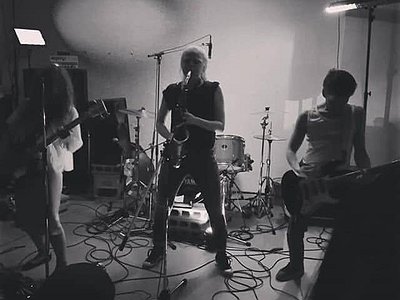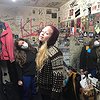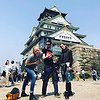Part 2
Derek Bailey defined improvising as the search for material which is endlessly transformable. Regardless of whether or not you agree with his perspective, what kind of materials have turned to be particularly transformable and stimulating for you?
Guro: Before I do a solo concert I think of nothing, not because I have planned it, it's like the brain refuses to take action towards the situation. It just has to be all open.
As no room is the same and being philosophical, I am not the same as I was the other day, improvisation means interacting openly with transformable matters, myself included. A struggle not to struggle to enter this stage within. To allow just the presence.
Mette: I think form, room/acoustics and the audience. I think form is a great big void or infinite landscape to be explored, and often broadened through life, bandmates, family, friends, books, art, music, food. And then sound (and phrasing) as texture and 3 dimensional. And then finally the audience as an energy vibrating the room and setting sound into motion just by being present.
How is playing live in front of an audience and in the studio connected? What do you achieve and draw from each experience personally? How do you see the relationship between improvisation and composition in this regard?
Guro: To play live in front of people, that's where my core motivation lies. What is born in this meeting at every concert. It's my fuel and even though it's a long time since I played a concert, the energy from playing in front of an audience is what brings me inspiration to keep pushing, creating and rehearsing.
To work in the studio has changed over the years, from wanting it to be an exact representation of the music I do live into being a whole other medium and really creating something which is not possible to do live. It's fun, composing right there on the recording session, making up song instructions there and then. We have done that a great deal with MoE and Mette!
In a way in every composition I try to find the same spirit in the music as if it was improvised. Improvising in front of an audience allows the eyes also to be a big part of the experience. The visual perception and the presence of being in the same room together with the performed music.
Mette: Yeah, we worked on the first album with MoE and Mette using improvisation and recording as a tool to compose. But the latest album with Ikuro Takahashi was mere improvisation. And right now we are working on a third album for which we used a lot of preparation beforehand in the practice room, writing material to bring into the studio to try out. And on the third album the post-production will become a much bigger part of the final sound and form of the finished album.
Working like that in the studio has been rewarding for me creatively. Recording is, as Guro says, a completely different medium, and it goes on a broad spectrum: from trying to get across a vibrant energy in a mix, to being able to produce an album and using actual post production as a compositional tool, getting the expression and message of a band across, navigate through recordings in the studio and setting a direction through an album.
Could you take us through a day in your life, from a possible morning routine through to your work? Do you have a fixed schedule? How do music and other aspects of your life feed back into each other - do you separate them or instead try to make them blend seamlessly?
Guro: Being creative is rooted in all aspects of living. I mean how much improvising doesn't a family with kids do every day. Or every person. That's my belief. And that the mission is how to use the best out of your surroundings and that everything is transformable. Also have goals and navigation points that you move towards, which do not eliminate being aware of your present situation and being in a position of adapting, pressure and improvising, all depending on what the situation needs. I find this is what I want to be better at in every aspect of my life, being creative, being a performer and as a partner, being in relations with other people.
I usually make a schedule for every day, sometimes for a longer stretch of time, depending on what I need to do, be it planning tours, composing for others, making music for MoE, working with others. Being close to my voice and bass through practice is important. I start with a run or dancing, and stretching before anything else. Then coffee or tea and writing. Then rehearsal and then more writing. Hopefully a band practice. We haven't had a rehearsal space since last February as we were going to be on tour almost all last year. So we have been living with all our gear in our living room for a year now.
Mette: I mean, when touring, life on the road becomes your everyday. And there is rarely a regular schedule.
Mostly my last 8 years have been living out of a bag on the road. I have a tiny apartment and a base in Trondheim, but have had little time there. Now with the pandemic I have been at home since march 2020, and have had a lot of time to get a rhythm and flow here. There is a vibrant scene in Trondheim, and a lot of things are happening locally at the moment. I have been working on some new projects here and started a new venue www.stillverk1.no. Also it's been exotic to be able to do a weekly swim course, fill the fridge with food that I am gonna cook at home, fabrications of chilli hot sauces inspired by Guro Moe of course.
And I believe as Guro says, that being creative is rooted in all aspects of living. When you are on the road, that becomes living. When you are more at home you see how the music is in everything and creativity seeps into/out from your everyday actions.
Could you take me through the process of improvisation on the basis of one of your performances that's particularly dear to you, please? Where did the ideas come from, how were they transformed in your mind, what did you start with and how do you refine these beginnings into the finished work of art?
Guro: I have gotten a glimpse into my own navigation in improvisation, because of all this reflection time without concerts. I see I navigate towards energies and sometimes colors, and I cannot help it that I lose everything else in the presence while playing and improvising. How to remember a specific one … tricky!
Mette: There has from the start been a strong foundation in intuition for me, intuition and balance. The conception of balance has changed as I grew, lived and learned and now contains a lot more elements to it. And in recent time I have started going “backwards” disintegrating, dissecting and analysing.
Also one of the main issues with art, is the word art and its associations with elevated fine culture, when in fact art is pretty basic. Like a basic instinct, in what makes us human. An instinct of humans trying to regenerate what is already there in nature. Most destructive is ego. And the last decades all we have been fed is how to nurture the ego and make the “I” stand out. And all that does, is take us further from our roots as equal beings. Like a tree is not just a tree, it exists because of a network of roots in the ground with other trees.
There are many descriptions of the ideal state of mind for being creative. What is it like for you? What supports this ideal state of mind and what are distractions? Are there strategies to enter into this state more easily?
Guro: My own self awareness is always my main distraction. Thinking of you next to others. Social media is awful in that aspect. But I feel I have found access into this state of mind more easily during the restrictions the pandemic has given. Because I have had nowhere to go.
Being in all absorbing tour conditions help me open this space because other parameters choose for me what my limitations are. Away from my own self awareness. What it certainly needs is time. I have a cabin by the Oslo fjord where I often go and this is a place where the ideal state of mind is easily accessible. Nature always helps.
Mette: I feel that, “that state of mind” is always present. This year I have been trying to detach myself from it and reshape it. It is like a hyper awareness. (In the simplest form it´s as basic as breathing.)
How do you make use of technology? In terms of the feedback mechanism between technology and creativity, what do humans excel at, what do machines excel at?
Guro: Being creative is still the strongest human quality. Technology cannot make something the mind not yet has done. But they are helpful for each other. And can create something incredible because of their different qualities.
Mette: I just spoke with some friends of mine about how to bring electronics into your set up and still make it feel like an extension of your instrument and how to balance the expression, without it being more one thing than the other and becoming a negative feedback mechanism, restraining your interaction and flow. I think there will always be a latency in working with electronics, compared to that instant thought and reaction. But that in itself doesn't have to be a negative process. I like the sound from electro acoustic set ups a lot. Sound of human, sound of machine.








